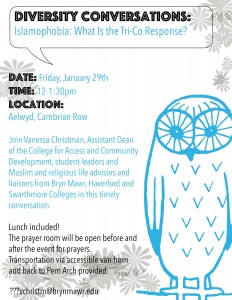On January 29th 2016, a group of people from the Bryn Mawr community, the Tri-College community, the general Philadelphia region, gathered in Aelwyd, the religious house on Cambrian Row, to have a conversation about islamophobia.
The attendants varied in age, from students of the undergraduate community, to staff members, to members of the graduate school. People were there for different reasons, and among our smaller groups, we discussed some of those reasons.
Some people, like me, said they were personally affected by islamophobia, and wanted to see what other people’s views on it were, what some solutions we had to offer would be. Some people could see how a certain presidential candidate’s rhetoric was affecting their Muslim friends and their friends of color. Some were allies. Others were people who also come from other marginalized communities and wanted to share their insight. There were people who worked in religious life groups and people who did not. It was a good, varied group of people who attended, and the conversations I overheard and were later revealed to the larger circle, spoke of that level of diversity present in the room.
The format of the conversation was relaxed. People mused, people formed thoughts while speaking, and while nothing concrete happened: we didn’t eradicate islamophobia in America, and I’d hazard a guess and say not everyone left feeling completely changed BUT as a student, I got to see that there were people who are trying to make an effort. We got non-Muslims who said that they did not think that ‘ending’ islamophobia in the United States rested solely on us as Muslims, that islamophobia is inherently white supremacy in action and that they, too, should take the lead in shutting down islamophobia comments. I got to see that there are people, friends in fact!, who are planning on writing books and literature with more Muslim characters to increase representation and Muslim presence in other communities. I got to see that administrators care, and they want our input on how to show that they care, how to start a conversation with a Muslim student who might be upset or concerned. Or whether it is appropriate to do that.
And I am so glad that people of other communities were present. So often it feels whenever a marginalized group speaks, they are speaking into the void. Our voices reverberate and come back, aimed at us, and we feel like the only people listening to us are other Muslims. Seeing how many people were present this Friday afternoon was excellent, and everyone who was there, who made time to share and reflect, everyone who spoke into the circle or who just talked to their neighbors, is very sincerely thanked.
It is difficult for me to state what was said in the meeting, both because we did speak in abstract terms and did move amongst different conversations very fluidly, but also because I want to respect the thoughts and voices of the people who spoke today, and who expressed their opinions under the assumption that they were entering a safe space where they could share their thoughts without fear. And so, with that said, after obtaining her permission, I would like to add some of the final thoughts said in the conversation today.
Professor Manar Darwish, an Arabic professor, symbolically ended the conversation with a verse of the quran which says:
“يا أيها الناس إنا خلقناكم من ذكر وأُنثى وجعلناكم شعوباً وقبائل لتعارفوا إن أكرمكم عند اللّه أتقاكم إن اللّه عليم خبير”
Quran, 49:13, Soorat Al Hujurat
Which, translated into English, says, “O people! Behold, We have created you all out of a male and a female, and have made you into nations and tribes, so that you might come to know one another. Verily, the noblest of you in the sight of God is the one who is most deeply conscious of Him. Behold, God is all-Knowing, all-Aware.”
Stay safe, be kind, and know one another <3

